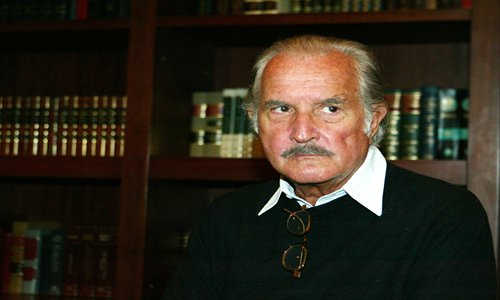The soul of Mexico
"It is a book about Mexico, but it is more than a book about Mexico. Men and women, grass roots and the elite, the destiny of the individual and the country's fate … all of these elements converge in a grand symphony. And through this symphony, people can always feel something springing up deep inside the soul of Mexico …"
These words, written by Zhang Weijie, appear in the introduction to the Chinese translation of a book by the late Mexican author and public intellectual, Carlos Fuentes (1928-2012).
Before setting to work on Los Cinco Soles De México (The Five Suns of Mexico, 2002 and translated into Chinese in 2009), Zhang had never even been to Mexico.

Major research
Zhang is a teacher at the Spanish department of the School of Foreign Studies at Nanjing University and is a major researcher on the life and works of Fuentes. He has also translated Fuentes' En Esto Creo (In This I Believe, 2000) in 2007.
"It was this book which presented an 'all-round' vision of Mexico to me, a full two years before I actually went to the country," Zhang told the Global Times. "After several years researching him and his prolific works, I realized that Fuentes is not simply a Mexican writer; he also threw in his lot with many other Latin American countries and even the whole world."
Zhang believes Fuentes' universalism is proved by his last message on Twitter before his death on May 15: "There must be something beyond slaughter and barbarism to support the existence of mankind and we must all help search for it."
The passing of the 83-year-old prompted many outstanding writers and public figures to pay tribute to him, both within and outside of Mexico.
The Mexican president Felipe Calderón wrote on Twitter, "I am profoundly sorry for the death of our loved and admired Carlos Fuentes, writer and universal Mexican. Rest in peace." The 2010 Nobel Prize winner, Mario Vargas Llosa added, "With him (Fuentes), we lose a writer whose work and whose presence left a deep imprint."
Last Thursday, Zhang and Gui Yi, another teacher of Spanish from Nanjing University, along with Rolando Garcia Alonso, consul general of Mexico in Shanghai, came together to hold a memorial lecture about Fuentes. The event took place at the Miguel de Cervantes Library, in the cultural department of the Spanish consulate on Anfu Road.
Along with Gabriel Garcia Marquez, Mario Vargas Llosa and Julio Cortázar, Fuentes was one of the most admired writers during the explosion of Latin American literature that occurred in the 1960s and 70s, known as "El Boom."
More than 60 published works of Fuentes consisted of novels, essays, short stories and plays. He was also very politically engaged, writing for magazines, newspapers and various journals.
Zhang said that Fuentes' rich personal experience and broad learning contributed much to his literary achievements. "This especially helped him in the creation of his many grand themes, such as history, ethnicity and social democracy," he said.

American education
Because of his father's posting as a diplomat, Fuentes was born in Panama. He started his schooling in Washington D.C. and it was his experiences as an outsider in the US during the 1950s and 60s that inspired him to become a writer.
"Fuentes grew up with an American education, but was always seeking his identity as a Mexican," said Gui. "From his first writings, his concerns have always been very closely related to the history of Mexico."
Fuentes himself described his first novel, La Región Mas Transparente (Where the Air Is Clear, 1958) as "a biography of the city (Mexico City)."
The novel is set in the Mexican capital in the 1940s and 50s and it mixes Spanish, indigenous and more contemporary Mexican influences. His second novel, La Muerte de Artemio Cruz (The Death of Artemio Cruz, 1962) centers on the Mexican Revolution (1910-20) and its effect on succeeding generations.
Zhang said that Los Cinco Soles De México is also about Mexican history, from very ancient times to the present day.

Hopeful future
"It's a collection of excerpts from Fuentes' novels and essays, whose subject matter ranges from the pre-Columbian conquest of the Americas, to modern times. In Fuentes' own words, it is a book combining both the 'extraordinary experience of the Mexican millennium and a hopeful look to the future,'" said Zhang.
Alonso said that as Mexico's ambassador to France from 1975 to 1977, Fuentes deftly combined an administrative and diplomatic career with his intense literary output.
"And at that time, he met other Latin American writers living in Paris including his fellow countryman, Octavio Paz Lozano (the 1990 Nobel laureate for literature) and the Argentinian writer Cortázar," said Alonso. "It is mainly thanks to the presence of this group in the French capital that Latin American novels made such an impact internationally."
Zhang told the Global Times: "Compared to Marquez whose One Hundred Years of Solitude is very well-known among Chinese people, and Llosa, who visited China last year, few people here are familiar with Fuentes. But I really believe he created work that transcends time and space, and which Chinese people will understand one day."
